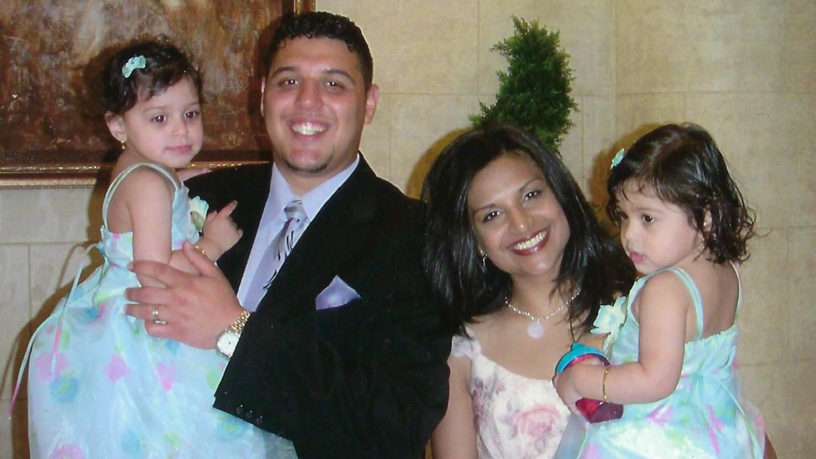
By Mariyah Salhia
Dear diaspora,
I was looking through my closet yesterday when I found an old outfit of mine. I probably could have donated it years ago. It’s really small and I couldn’t have been older than 11-years-old when I last wore it.
It’s a lehenga—a traditional piece of South Asian dress wear. There are plenty of different styles of lehenga, but mine is made of white chiffon with a mesh overlay, complete with intricate pink beading which form small flowers on the tank top. There’s matching beading down the skirt, crescendoing into a thick pink border at the bottom of the full skirt.
I remember going to buy it with my mom and aunt for someone’s wedding. Like so many other family weddings, the two of them would wrangle my sister and me to what seemed like hundreds of South Asian clothing stores and sometimes, the 747 Flea Market in Brampton, Ont.
Every store was the same: fluorescent lighting, outfits in a wide range of colours and styles, packaged neatly in plastic bags, stacked on shelves that went all the way to the ceiling and the finest outfits on display in the front windows. They always smelt the same too—like millions of years of fabric and aarti incense sticks had been trapped within the walls of the stores.
“This one is so cute for the Hindu ceremony,” my aunt would excitedly say to my mom after I’d spent 10 minutes posing in an outfit just outside the makeshift change room.
The lehenga was pretty and it felt grown up at the time. Looking at it in the garment bag in my closet now, it was hard to fathom myself little enough to fit into it.
But, I’ll never forget why this outfit meant so much to me.
Little me, getting out of that white lehenga in that tiny changeroom, annoyed at how much time I’d spent getting in and out of its long, poofy skirt, thought for the first time, “What the hell am I going to a Hindu wedding ceremony for?”
I know it sounds slightly harsh but I actually think a lot of little Muslim girls in my position might have had the same question. My strange mix of an Indo-Guyanese mom and Egyptian dad attracted a lot of those questions when I was small—many of them from strangers.
Of course I knew why I was literally going. Family is family and we never turn away from an excuse to get dressed up. But still, every part of the process reminded me I wasn’t the same as everyone who’d be sitting in that wedding hall.
Let’s get one thing straight: the mix is amazing. Thanksgiving at my house is like an international buffet—my Aunty’s lamb chowmein and my Teta’s macarona bechamel sitting on either side of my mom’s turkey. My parents’ anniversary parties are like a journey around the world. My eyebrows look like they belong on a hair growth advertisement and my cheekbones successfully convinced at least seven people I went to high school with that I learned how to contour at the ripe age of 14.
I was raised Muslim, my first birthday was at a mosque, I fast, blah blah blah. But I’ve been to more Hindu weddings than Muslim ones and growing up, attending these weddings always made it more apparent to me than anything else that I was different from my mother’s side of the family.
Being with my dad’s side of the family meant I could make jokes with my uncles and cousins about how watching the Food Network during Ramadan felt like we were cheating. But then they’d switch to Arabic which reminded my twin sister Mariyam and I that we were different from them, too.
Look, I hate to sound like the cliché biracial girl—if I’m even allowed to call myself that because the number of stories I have of people telling me I’m “not really biracial” could fill a novel. This isn’t me saying I’m having an identity crisis. It’s me explaining that people outside the biracial club don’t really understand the concept that I am fully Guyanese and I am fully Egyptian, plain and simple.
But that didn’t stop me from coming to the realization that having a Guyanese mom and an Egyptian dad meant that there were parts of those respective experiences I didn’t get. I don’t have a Caribbean dad, who is known to give strict curfews, or an Arab mom, who’s developed a reputation for being stringent on dress codes and overfeeding whoever they can. My mom bought me pretty much all of the clothes that got me unfairly sent to the principal’s office in high school and my dad is known to order a Hennessy at the beginning of the annual company Christmas party and nurse it until the last call. They couldn’t hit those stereotypes even if they were 10 feet wide.
To be clear, I never thought of that as a bad thing. My mom’s fashion sense has given me the power to believe that I am the hottest person who ever lived and my dad’s respect for autonomy has kept me out of a lot of trouble. My parents love my sister and me fiercely and nothing was ever going to make little me think otherwise.
But still, sitting around with my cousins who uttered funny stories about their dads catching them sneaking in after they’d stayed out past curfew, or with my uncles, talking about how my Teta never let them keep their hair too long before taking them to get it trimmed, I couldn’t help but notice how different I was. These aren’t experiences I had and as soon as I told them I couldn’t relate then I was marked. I was different from them—for better or worse.
Growing up with one Egyptian parent meant I didn’t learn to speak or read Arabic, a fact that nearly every Arab I’ve ever met has reminded me of. One time, I was at a coffee shop and when I gave the barista my name, he said, “Your necklace says otherwise,” referring to my gold Arabic nameplate. The next few times I visited that coffee shop, he insisted on calling me Maria. He corrected someone else who called me Mariyah before handing me my latte. Of course, I only believed my nameplate said my name, how would I know any better? My dad never made me feel like I was any less Egyptian than him. “You are za Arab,” he’d say, jokingly mocking my Teta’s accent.
My mom is a little like me. She’s Muslim like her dad, but her mom, as well as her siblings, are Hindu. In Guyana, this is pretty normal— according to the United States Department of State’s 2022 Report on International Religious Freedom, 64 per cent of Guyana is Christian, followed by 25 Hindu, and 7 per cent Muslim. But my dad’s entire family was made up of devout Muslims, who were pretty much diametrically opposed to the religious concepts of Hinduism. I mean, come on, sex-positive iconography? My cousins would often talk about how “every Guyanese kid” heard the story of the man back home who swept the road until it was clean because his parents asked him to. Or even how annoying it was to come home and find their jacket smelling of curry after their parents had spent all day in the kitchen. My mom never made curry, in fact, we still really only eat it when my grandmother or aunt cook it, so I didn’t really know what that was like.
“There are lots of families like ours,” my mom would tell me. “And lots of people just like you, maybe not with eyebrows as nice as yours but…”
It was in these moments I’d think back to the barista who commented on my necklace, or the stories my cousins told and realized that aside from Mariyam, I was the only one who was going to understand that I was ethnic enough. What did I have to prove? The real challenge, I guess, would be the isolation of knowing there were things I’d miss out on, and knowing that those gaps mattered more to other people than they did to me.
I’m sure the little Mariyah, standing in that changeroom, probably getting a little sweaty because the zipper on that damn outfit always got stuck, didn’t think another lehenga was going to make much of a difference to her 22-year-old self. But, after looking at it yesterday, I decided not to give it away. I tucked it back into my closet so that I can be reminded there was a time before when I thought being biracial was something other people got to decide for me. Hopefully, there will be a time when I won’t.
Well, Diaspora, that’s all for today.
Yours truly,
Mariyah Salhia










Leave a Reply